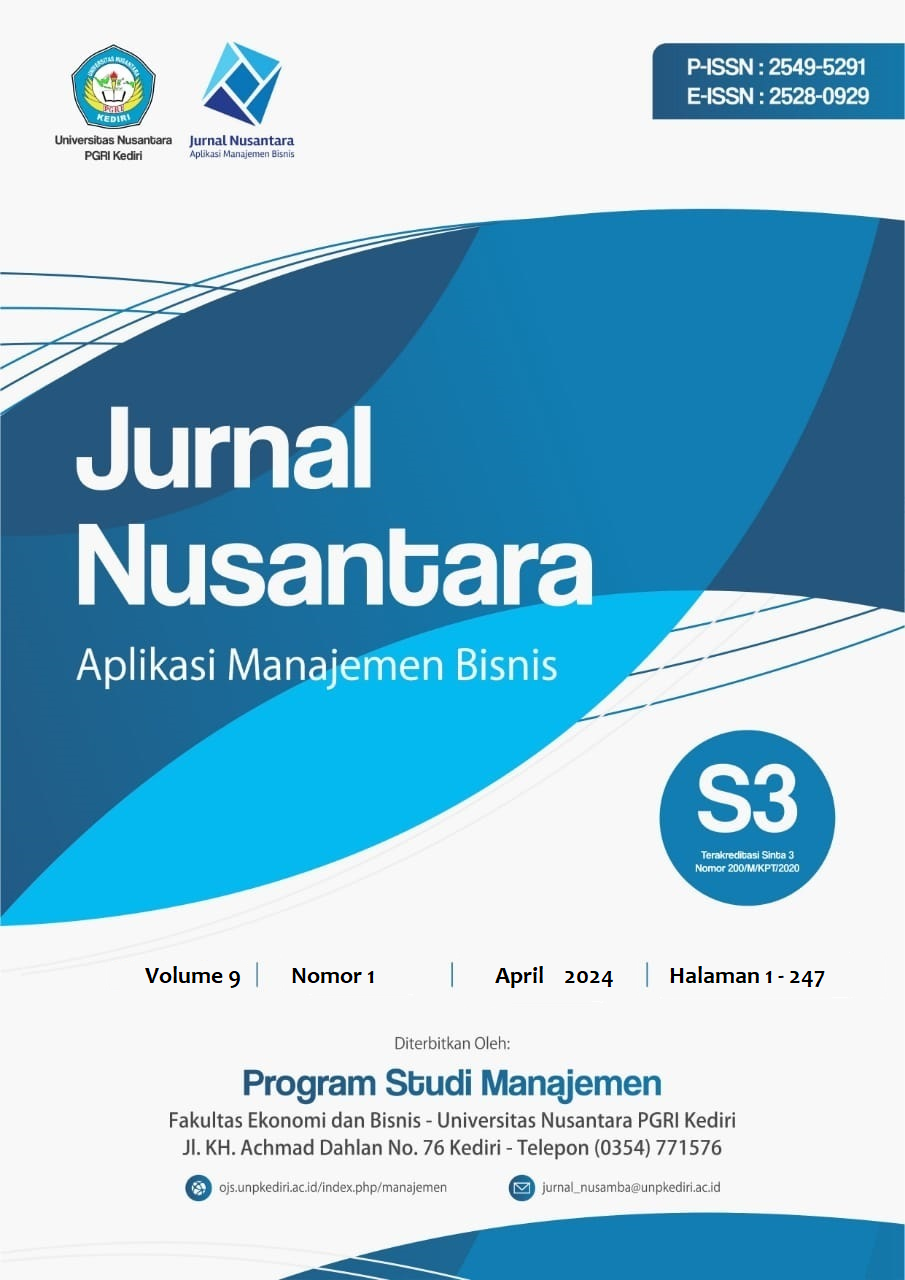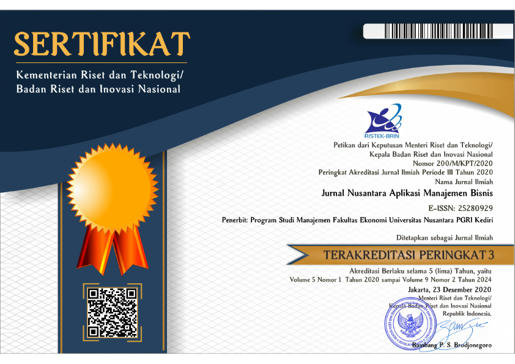Peningkatan Kinerja Pegawai melalui Kenyamanan Lingkungan, Kepemimpinan, dan Manajemen Waktu: Studi di Pemerintah Provinsi Kepulauan X dengan Mediasi Keterlibatan Pegawai
DOI:
https://doi.org/10.29407/nusamba.v9i1.20506Keywords:
Work environment, leadership, time management, employee engagement, employee performanceAbstract
Research aim: The purpose of this finding is to interpret the influence of employee comfort, leadership, time management, and employee involvement on employee performance.
Method: This research uses a quantitative approach with a survey.
Finding: These findings interpret that the work environment has a significant positive impact on employee engagement, but does not have a significant effect on employee performance. Meanwhile, leadership and time management have a significant positive impact on employee engagement and employee performance. Meanwhile, employee involvement itself provides a significant positive relationship to employee performance.
Theoretical contribution/Originality: These findings provide a deep understanding of the importance of good and quality leadership in increasing employee engagement and performance in government and corporate environments.
Practitioner/Policy implication: aspects that can have an impact on an employee's performance must always be considered and evaluated regularly so that employee productivity at work remains constant and even increases. Organizations and companies must also implement optimal human resource management to maintain employee loyalty and integrity.
Research limitation: Research limitations only focus on the object of research, namely Civil Servants in the Riau Islands Provincial Government.
Downloads
References
R. A. Mulia, “Pengaruh Kompetensi, Lingkungan Kerja dan Motivasi Berprestasi,” Jurnal Ilmiah Ekotrans & Erudisi, vol. 24, 2021.
A. Ardiansyah and S. Artadita, “Pengaruh Lingkungan Kerja dan Disiplin Kerja Terhadap Kinerja Karyawan Melalui Keterlibatan Karyawan Sebagai Variabel Intervening (Studi pada Divisi Produksi PT. Inoac Polytechno Indonesia Plan Tangerang),” e-Proceeding of Management, vol. 8, no. 5, pp. 6289–6303, 2021.
M. Naimah, F. Tentama, and E. Y. D. Sari, “Pengaruh Kepemimpinan Transformasional dan Keterlibatan Kerja terhadap Organizational Citizenship Behavior (OCB) melalui Mediator Kepuasan Kerja,” Psikologika: Jurnal Pemikiran dan Penelitian Psikologi, vol. 27, no. 2, pp. 197–222, Jul. 2022, doi: 10.20885/psikologika.vol27.iss2.art2.
Wagino, “Manajemen Waktu Bagi Pegawai,” Kementerian Keuangan Republik Indonesia, Feb. 21, 2022.
D. M. Dejoy and M. G. Wilson, “Organizational Health Promotion: Broadening the Horizon of Workplace Health Promotion,” American Journal of Health Promotion, vol. 17, no. 5, pp. 337–341, 2003, doi: https://doi.org/10.4278/0890-1171-17.5.337.
D. Abun, T. Magallanes, G. S. L. Foronda, and M. J. Encarnacion, “WP Employees’ workplace well-being and work engagement of divine word colleges’ employees in Ilocos region, Philippines,” International Journal of Research in Business and Social Science, vol. 9, no. 2, pp. 70–84, 2020, doi: https://doi.org/10.20525/ijrbs.v9i2.623.
P. Parker, A. J. Martin, S. H. Colmar, and G. A. D. Liem, “Teachers’ workplace well-being: Exploring a process model of goal orientation, coping behavior, engagement, and burnout,” Teach Teach Educ, vol. 28, no. 4, pp. 503–513, 2012, doi: 10.1016/j.tate.2012.01.001.
Y. Brunetto, S. T. T. Teo, K. Shacklock, and R. Farr‐Wharton, “Emotional intelligence, job satisfaction, well‐being and engagement: Explaining organisational commitment and turnover intentions in policing.,” Human Resource Management Journal, vol. 22, no. 4, pp. 428–441, 2012, doi: https://psycnet.apa.org/doi/10.1111/j.1748-8583.2012.00198.x.
D. Fan, L. Cui, M. M. Zhang, C. J. Zhu, C. E. J. Hartel, and C. Nyland, “Influence of high performance work systems on employee subjective well-being and job burnout: Empirical evidence from the Chinese healthcare sector.,” The International Journal of Human Resource Management, vol. 25, no. 7, pp. 931–950, 2014, doi: https://psycnet.apa.org/doi/10.1080/09585192.2014.876740.
J. Anitha, “Determinants of Employee Engagement and Their Impact on Employee Performance,” International Journal of Productivity and Performance Management, vol. 63, pp. 308–323, 2014, doi: https://doi.org/10.1108/IJPPM-01-2013-0008.
Slemp. Gavin R., M. L. Kern, and D. A. V. Brodrick, “Workplace Well Being: The Role of Job Crafting and Autonomy Support,” Psychol Well Being, vol. 5, no. 1, pp. 1–17, 2015, doi: http://dx.doi.org/10.1186/s13612-015-0034-y.
K. Nielsen, M. B. Nielsen, C. Ogbonnaya, M. Känsälä, E. Saari, and K. Isaksson, “Workplace resources to improve both employee well-beingand performance: A systematic review and meta-analysis,” Work Stress, vol. 31, no. 2, pp. 101–120, 2017, doi: http://dx.doi.org/10.1080/02678373.2017.1304463.
C. Zehir and E. Erdogan, “The Association between Organizational Silence and Ethical Leadership through Employee Performance,” International Strategic Management Conference, vol. 24, no. 42, pp. 1389–1404, 2011, doi: 10.1016/j.sbspro.2011.09.054.
I. Buil, E. Martinez, and J. Matute, “Transformational leadership and employee performance: The role of identification, engagement and proactive personality,” Int J Hosp Manag, pp. 64–75, 2018, doi: http://dx.doi.org/10.1016/j.ijhm.2018.06.014.
S. Biswas and A. Varma, “Antecedents of Employee Performance: an Empirical Investigation in India,” Journal of Employee Relation, vol. 34, pp. 177–192, 2012.
J. Jyoti and S. Bhau, “Impact of Transformational Leadership on Job Performance: Mediating Role of Leader–Member Exchange and Relational Identification,” Sage Open, vol. 5, no. 4, 2015, doi: https://doi.org/10.1177/2158244015612518.
I. G. P. Kawiana, I. G. Riana, I. G. Rihayana, and I. N. R. Adi, “HOW TRANSFORMATIONAL LEADERSHIP INTENSIFY EMPLOYEE PERFORMANCE MEDIATING BY JOB SATISFACTION ,” Jurnal Ilmiah Manajemen, vol. 10, no. 3, pp. 454–468, 2020, doi: dx.doi.org/10.22441/mix.2020.v10i3.010.
V. Baruna and E. Deinma, “Perencanaan Strategis Dan Karyawan Engagement: Tinjauan Teoritis,” Jurnal Strategis Bisnis & Manajemen Perubahan, vol. 9, no. 1, pp. 80–96, 2022.
W. Van Eerde, “Procrastination at Work and Time Management Training,” J Psychol, vol. 137, no. 5, pp. 421–434, 2003, doi: 10.1080/00223980309600625.
R. K. Pradhan and L. K. Jena, “Employee Performance at Workplace: Conceptual Model and Empirical Validation,” Business Perspectives and Research, vol. 5, no. 1, pp. 69–85, 2017, doi: https://doi.org/10.1177/2278533716671630.
J. Sahni, “Does Blended Learning Enhance Student Engagement? Evidence from Higher Education,” IBIMA Publishing Journal of e-Learning and Higher Education , vol. 2019, pp. 1–14, 2019, doi: DOI: 10.5171/2019.121518.
S. Yener, A. Arslan, and S. Kilinç, “The moderating roles oftechnological self-efficacy andtime management in thetechnostress and employeeperformance relationshipthrough burnout,” Information Technology & People, vol. 34, no. 7, pp. 1890–1919, 2020.
S. Shelar and A. Khatke, “Effectiveness of Work Life Balance towards Employee Engagement in Hospitals with special reference to Pune,” PalArch’s Journal of Archaeology of Egypt / Egyptology, vol. 18, no. 10, pp. 481–493, 2021.
M. A. Boyede and O. O. Omotoye, “Worklife Balance On Employee Engagement Among Women In Technical Education (Wited) In Polytechnics In Osun State, Nigeria,” Annals of Spiru Haret University, no. 3, pp. 89–107, 2021, doi: 10.26458/2134.
G. Azka, M. Q. Tahir, A. K. M, and T. H. Syed, “Transformational Leadership, Employee Engagement and Performance: Mediating Effect of Psychological Ownership,” African Journal of Business Management, vol. 5, no. 17, pp. 7391–7403, Sep. 2011, doi: 10.5897/ajbm11.126.
F. Shahzad, “Impact of Organizational Culture on Employees’ Job Performance: An Empirical Study of Software Houses in Pakistan,” International Journal of Commerce and Management, vol. 24, no. 3, pp. 219–227, Aug. 2014, doi: 10.1108/IJCoMA-07-2012-0046.
C. Sekhar, M. Patwardhan, and V. Vyas, “Linking Work Engagement to Job Performance Through Flexible Human Resource Management,” Adv Dev Hum Resour, vol. 20, no. 1, pp. 72–87, Feb. 2018, doi: 10.1177/1523422317743250.
A. T. Tensay and M. Singh, “The nexus between HRM, employee engagement and organizational performance of federal public service organizations in Ethiopia,” Heliyon, vol. 6, pp. 1–15, 2020, doi: https://doi.org/10.1016/j.heliyon.2020.e04094.
H. Almawali, N. I. A. Hafit, and N. Hasan, “Faktor Motivasi dan Prestasi Kerja: Peran Mediasi Keterlibatan Karyawan,” Jurnal Internasional Studi Sumber Daya Manusia, vol. 11, no. 3, pp. 67–82, 2021, doi: 10.5296/ijhrs.v11i3.18856.
R. I. Manikottama, L. M. Baga, and A. V. S. Hubeis, “Pengaruh Motivasi, Lingkungan Kerja dan Kepemimpinan terhadap Kinerja Karyawan PT Satu Visi Edukasi,” Jurnal Aplikasi Bisnis dan Manajemen, vol. 5, no. 2, pp. 242–252, May 2019, doi: 10.17358/jabm.5.2.242.
A. A. W. P. Tyas and N. Nurhasanah, “Model Keterkaitan Lingkungan Kerja, Kompetensi, terhadap Keterikatan Kerja melalui Self Efficacy di Balitbang Kementrian Hukum dan HAM RI,” Nov. 2019. [Online]. Available: https://www.researchgate.net/publication/337286201
E. Kusbiyanto, “Pengaruh Keterlibatan Dan Gaya Kepemimpinan Terhadap Kinerja Karyawan Dan Kepuasan Kerja Sebagai Mediasi,” Tesis, Universitas Muhammadiyah, Malang, 2020.
H. Susyanto, “Pengaruh Kepemimpinan, Keterlibatan Karyawan dan Kepuasan Kerja Terhadap Kesiapan Untuk Berubah Dalam Menghadapi Perubahan Organisasi,” Jurnal Ekonomi, Bisnis, dan Akuntansi , vol. 21, no. 1, pp. 1–20, 2019.
N. S. A. Sujarwo, “Pengaruh Manajemen Waktu Terhadap Kinerja Pegawai di Pusat Pengembangan dan Pemberdayaan Pendidik dan Tenaga Kependidikan Taman Kanak-Kanak dan Pendidikan Luar Biasa,” Skripsi, Universitas Pendidikan Indonesia, 2022.
M. R. Halim, S. Mattalatta, and Junaidin, “Pengaruh Penerapan Manajemen Waktu Terhadap Kinerja Pegawai pada Badan Pengelola Keuangan Daerah Kabupaten Pangkep,” SEIKO: Journal of Management & Business, vol. 2, no. 2, pp. 182–188, 2019.
Downloads
Published
Issue
Section
License
Authors who publish with this journal agree to the following terms:
- Copyright on any article is retained by the author(s).
- The author grants the journal, the right of first publication with the work simultaneously licensed under a Creative Commons Attribution License that allows others to share the work with an acknowledgment of the work’s authorship and initial publication in this journal.
- Authors are able to enter into separate, additional contractual arrangements for the non-exclusive distribution of the journal’s published version of the work (e.g., post it to an institutional repository or publish it in a book), with an acknowledgment of its initial publication in this journal.
- Authors are permitted and encouraged to post their work online (e.g., in institutional repositories or on their website) prior to and during the submission process, as it can lead to productive exchanges, as well as earlier and greater citation of published work.
- The article and any associated published material is distributed under the Creative Commons Attribution-ShareAlike 4.0 International License












